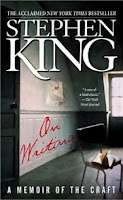On Writing: A Memoir of the Craft by Stephen King
Despite the differences in genre between me and Mr. King, this book was informative (and shared a wonderful analogy between dandelions and -ly adverbs). It touched on not only the specifics of writing, but also his experiences as well, letting every writer know he (or she) is not alone.
The Art and Craft of Writing Christian Fiction by Jeff Gerke
This guy is a great teacher. His books are written in a casual informative style as if he were having a cup of coffee with you. This book includes a section on writing a Christian novel and also covers topics like character, POV, and description, among others.
The Irresistible Novel (also) by Jeff Gerke This book covers writing rules and myths, as well as a section on hacking the brain and plotting. The Irresistible Novel is full of interesting, useful information (as is the previously mentioned title). I enjoyed reading them. And that's really saying something, because most non-fiction books put me to sleep. Sad, but true.
Proofreading Secrets of Best-selling Authors by Kathy Ide
This book is based off of The Chicago Manual of Style, but at a quarter of the size, it's a lot less intimidating. Kathy covers punctuation, usage, grammar, and spelling. This book hasn't made me perfect, but it's helped me with my punctuation and answered those questions that show up during late-night revisions.
The Emotion Thesaurus by Angela Ackerman & Becca Puglisi
I love this book -- many thanks to my author friend Deanna Fugett who sent it to me. It helps immensely with showing vs. telling, and prevents an author from writing the same action over and over to show certain emotions. For example, rather than telling your reader about John who's anguished, you can show him muttering and rocking back and forth, while visibly sweating.
The Writer's Digest Guide to Science Fiction and Fantasy by Orson Scott Card and the Editors of Writer's Digest
At 422 pages, this is an encyclopedia on the subject of writing science fiction and fantasy, and I've turned to it many times, sometimes even just to refresh my memory on something like world cultures or ritual and ceremonial magic. I haven't read it all the way through. Instead, I treat it like a buffet of ideas and information, picking and choosing as needed.
The Artist's Way by Julia Cameron
The Artist's Way deals with writer's block and creativity. It's originally set up as a 12-week process, but I personally went through it as I had time. I also appreciated the author mentioning God as the Great Creator, the Beginning and Ending of creativity .
Now, it’s your turn. What books have you found the
most helpful in your writing journey? Leave your favorite titles in the comments section.



These sound like great resources, thanks Jill! I'll admit I don't read much non-fiction, but I found Self-Editing for Fiction Writers by Renni Browne and Dave King really helpful.
ReplyDeleteOoh, I think I read that one awhile back (too many years to count at this point!)But there are so many good ones out there, you just need to find the one that helps *you* the most. Thanks for sharing!
DeleteGreat list, Jill. I have been meaning to read Stephen King's book for some time. I haven't read the two Jeff Gerke books you listed, but I thought was Plot Vs Structure book was excellent. Kathy Ide's book and the Emotion Theasaurus are great references.
ReplyDeleteIs it just me or does the Stephen King cover seem a bit creepy? I've not read the other books except The Emotion Thesaurus which I find extremely helpful! -Julie K
ReplyDelete